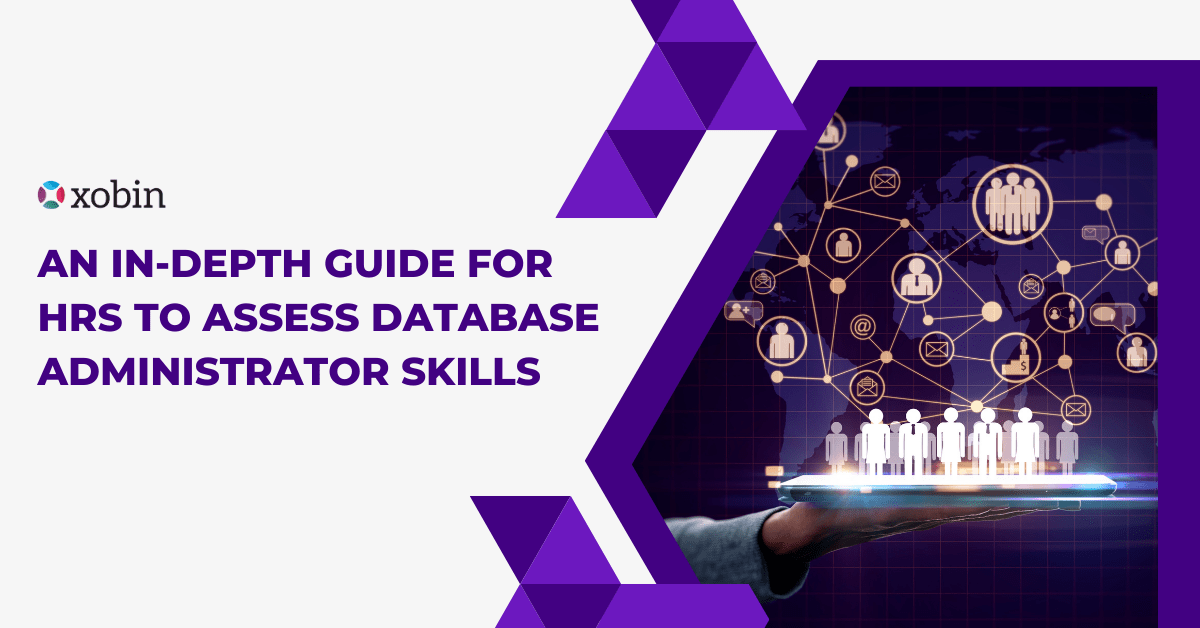File boxes are almost a thing of the past. Instead of storing data on paper, companies now rely on cloud storage. With unlimited space available, businesses manage more data than ever, making database administrator skills essential. These professionals design secure systems to store and organize data efficiently. For recruiters looking to hire top talent in this field, skills testing software plays a key role in evaluating candidates.
However, most human resources (HR) departments have limited knowledge of how a database admin does all that. This limited knowledge makes it hard for them to know how to hire a competent person for their organization. With our guide, your HR team will know exactly what to look for in a Database Administrator.
Table of Contents
Essential Database Administrators Skills and Traits to Look For
Database administrators and managers are in charge of every data-related task in your organization. If your company is smaller, the administrator might work independently or oversee a small team of data analysts. In larger companies, the admin might manage a bigger network of IT specialists.
When you’re looking to hire a database admin skills, you’ll want someone with a particular set of skills. These include mastery of database management systems (DBMS) and an expert understanding of security protocols and encryption. Your ideal candidate must also show they can communicate well with an IT team and make calculated decisions under pressure.
We’ll start by discussing the key skills to look for on a resume and then move on to the traits you should evaluate after the initial round of interviews.
3 Key Technical Database Administrator Skills
When hiring a database manager with technical skill screening platform, there are three overarching skills a strong applicant will list on their resume. Let’s take a look at each one.

1. Mastery of Database Management Systems (DBMS)
Any database administrator expert worth their salt will list proficiency in SQL, NoSQL, and NewSQL on their resume. What is this alphabet soup of skills, you ask? Fair point. SQL stands for Structured Query Language. It is a domain-specific programming language designed for managing data. SQL is usually used to manage data stored in a relational database management system (RDBMS) or to process data in a relational data stream management system (RDSMS).
In other words, SQL is important for organizing and managing certain datasets—usually ones with a clear structure. Think rows and tables. NoSQL is a more flexible dataset that may or may not use Structured Query Language Assessment for organization. For example, a NoSQL database may contain structured and unstructured data and can scale horizontally as new information comes in. Some data might be in document stores, and other data might be represented in graphs.
With NoSQL, anything goes. Finally, NewSQL is a compromise between SQL’s rigid structure and NoSQL’s wild west. Your ideal database admin should be able to tell you the ins and outs of SQL, NoSQL, and NewSQL. They should also have in-depth knowledge of database Administrator and architecture and be able to build a unique system for your organization.
2. Data Security and Compliance
Database admins might be smart, but so are hackers. The last thing your organization needs is a massive data leak that puts sensitive information in the hands of bad actors. That’s why your ideal database manager should know everything under the sun about security protocols and encryption. Plus, best practices for database security are constantly evolving. Your ideal candidate should demonstrate the ability to keep up with—or even ahead of— security trends.
Another key consideration is compliance with industry standards. Most organizations should adhere to General Data Protection Regulation (GDPR) guidelines for privacy. It’s just a baseline best-practices benchmark for everyone to follow. And if you have the remotest chance of serving any European clients or website visitors, you’ll need to comply with GDPR anyway. You might as well get ahead of the game.
In addition to GDPR, make sure your candidate knows how to stay compliant with laws such as the Health Insurance Portability and Accountability Act (HIPPA) or the Family Educational Rights and Privacy Act (FERPA) if they apply.
3. Performance Optimization
Like any complex machine, a database system will need routine maintenance and troubleshooting. Ask your candidates what tools they’ll use to monitor the system so everything runs smoothly. How do they deal with minor issues? What about issues with big consequences, like the infamous damaged FAA file that canceled scores of flights in 2023?
An ideal candidate should also be able to list various query optimization techniques. In data-ese, query optimization means making sure each SQL query performs exactly what it needs to do and nothing else.
3 Important Database Administrator Skills to Evaluate
Now you know the top knowledge-based skills to look for in a star database manager candidate. You’ve interviewed several candidates, and they’ve wowed you with their knowledge of SQL, database security, and performance optimization. It’s time to pick a few promising candidates and move to the next phase of your hiring process: evaluation.
How you evaluate database admin clients is up to you. Some HR teams hire a DevOps consultant to help assess your top candidates’ database administrator management skills. Others ask references for detailed information on how a candidate has previously reacted to various situations and problems. Here’s what you want to evaluate.
1. Communication and Collaboration
A good manager must communicate well with a team, whether they’re in IT or another industry. Introduce candidates to your existing IT team if you have one. Invite your team to show your candidates the ropes. Observe the interactions with your IT team. Does your candidate seem knowledgeable? Friendly? Easy to work with? Assertive?
Remember: your top pick can’t just be an excellent database architect. They must also know how to work with their team to keep all the cogs in your database machine functioning as they should.
2. Scenario-based Problem Solving
If you have a DevOps or IT consultant on hand to help, now is the time to create a simple scenario for your candidate to solve. Your job is to assess the potential new hire’s troubleshooting skills in real-time.
How do they act when they get stuck? Do they seem confident or unsure? How long does it take them to solve the problem? How long, according to your consultant, should they have taken? You can also gather a list of common database performance issues and ask candidates what they would do in each scenario. Here are a few examples:
- “What would you do to optimize a slow-moving SQL query?”
- “How would you handle NULL values?”
- “How would you design and normalize a database?”
You should research the answers to any questions you ask before you ask them. You can also hire a DevOps consultant to sit in on the interview with you!
3. Decision-Making Under Pressure
A database administrator will face immense pressure at some point in their career, and it might be while they’re with you. So, how will they handle time-sensitive scenarios and stressful situations? What will they do if a swath of data gets wiped out and they have to recover it? Be straightforward. Ask these questions. Look for calm, detailed answers.
It is even better if your candidate describes how they’d:
- Avoid the situation in the first place
- Create detailed procedures for different types of recovery operations before they’re needed
- Review the incident afterward and put in safeguards to keep it from happening again
Study Your Notes
After interviewing, studying, and evaluating each candidate on their Database Administrator Skills, it’s time for you to sit down with the information and think about your options. Only you will know which candidate fits your organization best. But with this guide in your pocket, you’re sure to pick someone who knows their stuff—and can get everyone else in the IT department on the same level.






